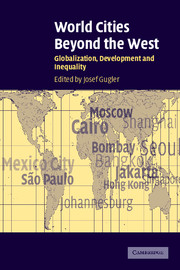Book contents
- Frontmatter
- Contents
- List of figures
- List of maps
- List of tables
- List of contributors
- Acknowledgments
- World cities beyond the West
- Introduction
- Part 1 The impact of the global political economy
- Part 2 The impact of the state
- 6 Moscow's changing fortunes under three regimes
- 7 Hong Kong's pathway to becoming a global city
- 8 Singapore: forming the family for a world city
- 9 Jakarta: globalization, economic crisis, and social change
- Part 3 The impact of popular movements
- Afterword
- Index
- References
6 - Moscow's changing fortunes under three regimes
Published online by Cambridge University Press: 12 October 2009
- Frontmatter
- Contents
- List of figures
- List of maps
- List of tables
- List of contributors
- Acknowledgments
- World cities beyond the West
- Introduction
- Part 1 The impact of the global political economy
- Part 2 The impact of the state
- 6 Moscow's changing fortunes under three regimes
- 7 Hong Kong's pathway to becoming a global city
- 8 Singapore: forming the family for a world city
- 9 Jakarta: globalization, economic crisis, and social change
- Part 3 The impact of popular movements
- Afterword
- Index
- References
Summary
Three distinctly different cultural, economic, and political epochs have characterized Moscow's role as a world city. The first was that of imperial Russia. This epoch lasted several centuries until internal social, political, and economic dysfunctional conditions combined to set the stage for the Russian revolution of 1917. This event of global significance ushered in Soviet socialism, a theoretically egalitarian system which lasted until its own internal inconsistencies caused it to implode in 1991. Since then a new political order of fifteen independent countries has arisen from the ashes of the former Soviet empire. In 1991 Russia was launched on the road to liberal democracy and a market economy, or what passes for both in this new epoch. Contemporary Moscow retains its historical role of capital city. It still retains claim, albeit presently somewhat diminished, to world city status.
Tsarist-era Moscow
Founded in the middle of the twelfth century, Moscow's early history was defined first and foremost by its role as a military outpost. By the mid-fifteenth century it had emerged as the center of Russian Orthodoxy. Barely two centuries later Moscow was celebrating its role as the “third Rome,” a place where liturgy would never be compromised by the politics of religion as had occurred in both Rome and Constantinople. Although over time trade and commerce figured ever more prominently in Moscow's economic base, the major economic, political, and social developments which helped to define the evolution of neighboring European cities and states seldom penetrated far into the Russian Empire.
- Type
- Chapter
- Information
- World Cities beyond the WestGlobalization, Development and Inequality, pp. 191 - 211Publisher: Cambridge University PressPrint publication year: 2004
References
- 1
- Cited by

